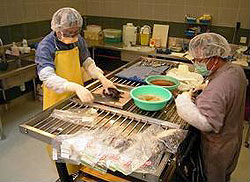 AVIAN INFLUENZA INCIDENTS AVIAN INFLUENZA INCIDENTS
Dead Bird Surveillance
The AFCD has provided a collection service for debilitated/dead birds as part of its surveillance programme of avian influenza (AI) in wild birds since October 2005. If suspicious debilitated/dead birds are found by the public, they may call the government hotline to inform the AFCD. The Department offers handling advice to the public or, if necessary, sends staff to collect the bird for AI testing in a veterinary laboratory. Up to the end of March 2006, the Department had collected over 6 000 bird samples, of which 15 wild birds were found with the virus.
Local Poultry Farms -- Voluntary Surrender Scheme for Livestock Farm Licences
The AI outbreaks that struck Southeast Asia in 2004 clearly indicate that AI viruses are becoming more pathogenic – namely, growing resistant to certain anti-viral drugs. To reduce the risk of human infection from disease and to deal with the possibility of a pandemic, the Administration has reviewed the risk management of live poultry in Hong Kong. It concluded that contact between humans and large numbers of live poultry should be minimised in order to reduce the risk of an epidemic, and that the total live chicken population be reduced to around two million.
As the Administration intends to implement central slaughtering of poultry in Hong Kong, the existing modus operandi of live poultry farming and wholesaling will undergo a fundamental change. The Administration deems it appropriate to introduce a voluntary surrender scheme for licensed poultry farmers who no longer wish to operate in this new environment. The scheme was submitted to the Legislative Council on March 14, 2005 and was in place for application on August 5, 2005.
Bird Gardens and Stalls
Environmental and fecal samples from all bird parks in Hong Kong are regularly collected for testing. Daily fecal samples are also collected for tests of AI in some wild bird congregating areas such as the Mai Po Nature Reserve. In 2005, we tested around 4 200 fecal samples from wild birds, all with negative results. The Department posted notices at the entrance of Mai Po Nature Reserve to remind the public of personal hygiene, advise them to keep away from wild birds, their nests, eggs, feathers and droppings, and to wash their hands thoroughly after coming in contact with them.
 Backyard Farms Backyard Farms
The highly pathogenic H5N1 virus was found in a backyard chicken from Yuen Tun Shan in early February 2006. To safeguard public health, the Department deployed staff to patrol villages in the New Territories and encouraged villagers to surrender their backyard poultry. New legislation was also enacted on February 13, 2006 to ban the keeping of backyard poultry, including chickens, ducks, geese, pigeons and quails. Offenders are liable to a fine of $50,000 to $100,000.
WETLAND PARK
 The Hong Kong Wetland Park (HKWP) is a Millennium Capital Works project designated by the Government of the Hong Kong Special Administrative Region (HKSAR), China. Located in north western Tin Shui Wai, the HKWP is an important new facility for tourism and conservation education. It has an interactive visitor centre of 10 000 square metres plus a 60-hectare re-created wetland reserve. The HKWP complements the area’s natural beauty with a modern museum that uses state-of-the-art technology to explain the local ecology while also ensuring environmentally-friendly operations. The HKWP was officially opened to the public in May 2006. The Hong Kong Wetland Park (HKWP) is a Millennium Capital Works project designated by the Government of the Hong Kong Special Administrative Region (HKSAR), China. Located in north western Tin Shui Wai, the HKWP is an important new facility for tourism and conservation education. It has an interactive visitor centre of 10 000 square metres plus a 60-hectare re-created wetland reserve. The HKWP complements the area’s natural beauty with a modern museum that uses state-of-the-art technology to explain the local ecology while also ensuring environmentally-friendly operations. The HKWP was officially opened to the public in May 2006.
To help this new facility fulfils its ecological-mitigation function, the Department continues to conduct ecological surveys at HKWP. Up to 2005, we had recorded 191 species of birds, half of which were waterbirds or wetland-dependant birds, including the rare Black-faced Spoonbill and Greater Painted Snipe. During the same period, nine amphibian species, nine reptile species, eight mammal species, 10 fish species, 39 species of odonates and 113 species of butterflies were also recorded.
ORGANIC FARMING
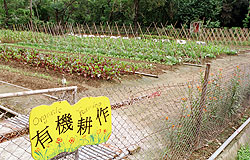 Organic farming is an agricultural production system that emphasises “Working with Nature” to preserve the integrity of the ecosystem. Through the selection of suitable crop varieties, composting, crop rotation, application of natural pesticides and the adoption of other environmentally-friendly practices, fertility and pest problems encountered in crop production can be effectively dealt with. Chemical fertilisers, synthetic pesticides and genetically engineered materials are totally prohibited. Organic farming is an agricultural production system that emphasises “Working with Nature” to preserve the integrity of the ecosystem. Through the selection of suitable crop varieties, composting, crop rotation, application of natural pesticides and the adoption of other environmentally-friendly practices, fertility and pest problems encountered in crop production can be effectively dealt with. Chemical fertilisers, synthetic pesticides and genetically engineered materials are totally prohibited.
Since December 2000, the Department has been helping local farmers shift toward organic farming practices. Knowledge, technical support and low-interest loans are provided to farmers, while the Vegetable Marketing Organisation assists farmers in selling their organic produce through its established sales channels.
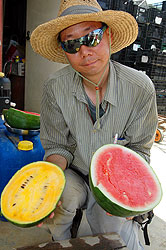 Up to December 2005, 50 farms covering a total area of 25 hectares have joined our “Organic Farming Support Service”. Together, they produce about two tonnes of organic vegetables per day, including vegetable varieties such as lettuce, white cabbage, flowering cabbage, water spinach, Chinese spinach, Chinese kale, Garland chrysanthemum, egg plant, bitter cucumber, wax gourd, yard-long bean, cherry tomato and carrot. Up to December 2005, 50 farms covering a total area of 25 hectares have joined our “Organic Farming Support Service”. Together, they produce about two tonnes of organic vegetables per day, including vegetable varieties such as lettuce, white cabbage, flowering cabbage, water spinach, Chinese spinach, Chinese kale, Garland chrysanthemum, egg plant, bitter cucumber, wax gourd, yard-long bean, cherry tomato and carrot.
The Department also supports the Hong Kong Organic Resource Centre (HKORC), a non-profit organisation co-founded by the Hong Kong Baptist University, the Hong Kong Organic Farming Association and the Produce Green Foundation, to develop and implement certification standards for organic production and processing in Hong Kong. Since the launch of this organic certification service in late 2004, 20 farms have been certified.
NATURE CONSERVATION POLICY REVIEW
Under the New Nature Conservation Policy announced in November 2004, the Department undertook to implement two pilot schemes at 12 priority sites identified for enhanced conservation, viz. public-private partnership (PPP) and management agreements with landowners (MA).
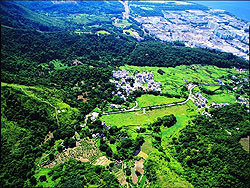 According to PPP, development at an agreed scale will be allowed at the less ecologically sensitive portion of a site, provided that the developer undertakes to conserve and manage the rest of the site that is ecologically more sensitive on a long-term basis. By the end of the application period in May 2005, we had received six proposals for pilot PPP projects. An inter-departmental Task Force chaired by the Environmental Protection Department and comprising representatives from ecological, environmental, planning, financial and legal authorities was set up to examine these proposals. According to PPP, development at an agreed scale will be allowed at the less ecologically sensitive portion of a site, provided that the developer undertakes to conserve and manage the rest of the site that is ecologically more sensitive on a long-term basis. By the end of the application period in May 2005, we had received six proposals for pilot PPP projects. An inter-departmental Task Force chaired by the Environmental Protection Department and comprising representatives from ecological, environmental, planning, financial and legal authorities was set up to examine these proposals.
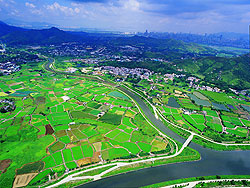 Under MA, non-governmental organisations (NGOs) may apply for funding from the Government for entering into management agreements with landowners. The NGOs provide landowners with financial incentives in exchange for management rights over their land or their co-operation in enhancing the conservation of the sites concerned. The Environment and Conservation Fund Committee approved a total of $4,620,350 to support three MA projects involving land located at Fung Yuen and Long Valley. The MA at Fung Yuen, undertaken by the Tai Po Environmental Association, aims to enhance and maintain the habitat and species diversity of private land at the Fung Yuen Site of Special Scientific Interest. The two MAs at Long Valley, undertaken by the Conservancy Association and the Hong Kong Bird Watching Society respectively, focus on co-operation with farmers for the conservation of wetland habitats and bird diversity on private agricultural land. These pilot MA projects will last for two years. The Department is overseeing their implementation to ensure that the pilot projects will enhance conservation of the sites concerned and better achieve Hong Kong’s nature conservation objectives. Under MA, non-governmental organisations (NGOs) may apply for funding from the Government for entering into management agreements with landowners. The NGOs provide landowners with financial incentives in exchange for management rights over their land or their co-operation in enhancing the conservation of the sites concerned. The Environment and Conservation Fund Committee approved a total of $4,620,350 to support three MA projects involving land located at Fung Yuen and Long Valley. The MA at Fung Yuen, undertaken by the Tai Po Environmental Association, aims to enhance and maintain the habitat and species diversity of private land at the Fung Yuen Site of Special Scientific Interest. The two MAs at Long Valley, undertaken by the Conservancy Association and the Hong Kong Bird Watching Society respectively, focus on co-operation with farmers for the conservation of wetland habitats and bird diversity on private agricultural land. These pilot MA projects will last for two years. The Department is overseeing their implementation to ensure that the pilot projects will enhance conservation of the sites concerned and better achieve Hong Kong’s nature conservation objectives.
|
|